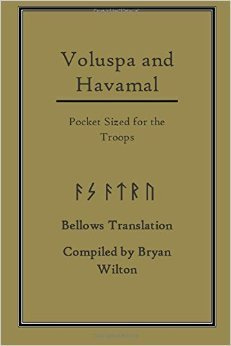This is an experimental piece, what may be the first of a series on passages from the poem Havamal - “Sayings of the High One;” a collection of advice both mundane and mystical attributed to Othinn, which is preserved in the Poetic Edda.
I have carried a copy of the ‘Voluspa and Havamal: Pocket Sized for the Troops’ almost everywhere with me since 2017. The cover is mostly tape at this point and it carries enough mud and coffee stains and creases to make it look a decade older than it is.
The Havamal is a wealth of wisdom explained as though from a father to a son. Rather than a handful of “thou shalt”s, the AllFather cites his own misadventures and mistakes as learned experience, which he passes on to the listener/reader.
I highly recommend the Havamal, it is only 165 one or two-line stanzas and there are several good translations out there, Bellows and Hollander being my preferred.
For my first study, I want to examine not the actual beginning of the poem, but at the passage I find myself going back to most frequently, and which I find addresses precisely the attitude and ideal I aspire to embody and represent through this page.
In both this and subsequent Havamal studies, I will include and reference both Henry Adam Bellows and Lee M Hollander’s translations of the same passage, for the sake of cross-referencing and to give the reader an idea of the character of the poem in it’s native context, rather than accepting a single English translation as verbatim.
Stanza 15 Bellows: The son of a king | shall be silent and wise, and bold in battle as well;
Bravely and gladly | a man shall go, Till the day of his death is come.
Stanza 15 Hollander: Let a King’s offspring | be sparing in words, and bold in battle;
glad and wholesome | the hero be till comes his dying day.
Othinn is outlining the proper attitude for an aristocrat, a young warrior-prince. While most of us probably can’t draw immediate lineage to actual warrior elites, I do not believe this prevents us from benefitting from the wisdom presented. The very next stanza, arguably far more frequently cited in Asatruar circles, states how an “unwise man” (or a “sluggard” depending on translation) won’t benefit from avoiding battle. Taking these together, I believe while Othinn uses the example of a “son of a king” to outline the idea, the ideal presented can and ought to be aspired to by, at the minimum, all fighting age men of the Folk.
Taking the passage’s advice, one recommendation at a time, firstly a man shall be “silent and wise/sparing with words.” This is a frequently recurring idea in the Havamal, and is reminiscent of Othinn himself, keeping what he knows tightly to himself until the right moment, and operating under alternate names and guises. A nobleman, and indeed a noble man, stands to lose a lot from poorly chosen words, and a lot to gain from well-chosen ones. Eloquence is not less eloquent for being withheld.
Secondly, a man shall be “bold in battle,” and given the Nordic proclivity for obscure metaphor and poetic turns of phrase, the fact both translations match tells me it is likely meant to mean precisely what it says. A nobleman must be both well-trained and comfortable with combat, with physical situations, and face them readily should they arise.
Thirdly, a man shall “bravely and gladly face his life/ be glad and wholesome in his life”, until his death finds him. Here the scope of what constitutes “bravery” does seem to apply beyond specifically physical confrontation. In the face of life generally, with it’s upsets, it’s challenges, it’s losses and setbacks, it is good and right to face it with bravery, and with good humor. For a god who sometimes goes by the name “Grim,” Othinn actually does not advise leaders be the surly, callous figure one might imagine a Viking-period king to have been.
While it’s not itself a piece of advice, I find the ending “till the day his death has come/till his dying day” to seem carefully chosen… as the rest of the poem, especially later on, dwells upon fate, knowledge of fate, and the burden it can be on the mind.
Bravery in the face of an opponent, or of life itself, is not a product of ignorance or assured victory, it is noble precisely because it is choosing to be of good cheer and strong will in the face of pain and setback and loss, with death understood and in mind.
I hope you found this article insightful, and please let me know if you’d like to see more pieces like this one!




I have actually just started here on substack my first ever social media lol. I've been a folkish asatruar for 35 years. I have been a practicing Bard( I am the official Historian/Skald of the Asatru Alliance)for many years now.So trying to get my stories out there to other heathens.I just posted my first video of one of these tales being told at our winter finding( the story of Ragnarok) check it out if you like. I'm always interested in constructive criticism and always trying to make connections with other Folk minded Asatruar.Hail to You for all your work , it's needed,Go with the Gods, Torna
Great work Asatruar, looking forward to the next article ,Hail Odin ,Hail the Folk